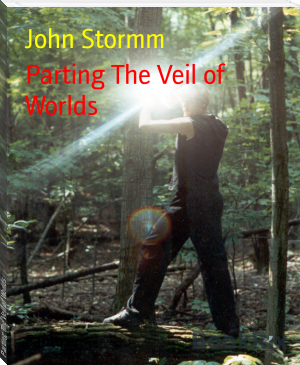The Well at the World's End: A Tale, William Morris [rainbow fish read aloud TXT] 📗

- Author: William Morris
Book online «The Well at the World's End: A Tale, William Morris [rainbow fish read aloud TXT] 📗». Author William Morris
Ralph looked askance at him fiercely, but the other heeded it naught: then said Ralph, "And how if she do not his will?" Said Morfinn, grinning: "Then hath my Lord a many servants to do his will." Ralph held his peace for a long while; at last he turned a cleared brow to Morfinn and said; "Dost thou tell of the Lord of Utterbol that he is a good lord and merciful to his folk and servants?"
"Fair sir," said the minstrel; "thou hast bidden me not speak of one woman, now will I pray thee not to speak of one man, and that is my Lord of Utterbol."
Ralph's heart fell at this word, and he asked no question as to wherefore.
So now they rode on both, rather more than soberly for a while: but the day was fair; the sun shone, the wind blew, and the sweet scents floated about them, and Ralph's heart cast off its burden somewhat and he fell to speech again; and the minstrel answered him gaily by seeming, noting many things as they rode along, as one that took delight in the fashion of the earth.
It was a fresh and bright morning of early autumn, the sheaves were on the acres, and the grapes were blackening to the vintage, and the beasts and birds at least were merry. But little merry were the husbandmen whom they met, either carles or queans, and they were scantily and foully clad, and sullen-faced, if not hunger-pinched.
If they came across any somewhat joyous, it was here and there certain gangrel folk resting on the wayside grass, or coming out of woods and other passes by twos and threes, whiles with a child or two with them. These were of aspect like to the gipsies of our time and nation, and were armed all of them, and mostly well clad after their fashion. Sometimes when there were as many as four or five carles of them together, they would draw up amidst of the highway, but presently would turn aside at the sight either of Ralph's war-gear or of the minstrel's raiment. Forsooth, some of them seemed to know him, and nodded friendly to him as they passed by, but he gave them back no good day.
They had now ridden out of the lands of Goldburg, which were narrow on that side, and the day was wearing fast. This way the land was fair and rich, with no hills of any size. They crossed a big river twice by bridges, and small streams often, mostly by fords.
Some two hours before sunset they came upon a place where a byway joined the high road, and on the ingle stood a chapel of stone (whether of the heathen or Christian men Ralph wotted not, for it was uncouth of fashion), and by the door of the said chapel, on a tussock of grass, sat a knight all-armed save the head, and beside him a squire held his war-horse, and five other men-at-arms stood anigh bearing halberds and axes of strange fashion. The knight rose to his feet when he saw the wayfarers coming up the rising ground, and Ralph had his hand on his sword-hilt; but ere they met, the minstrel said,—
"Nay, nay, draw thy let-pass, not thy sword. This knight shalt bid thee to a courteous joust; but do thou nay-say it, for he is a mere felon, and shalt set his men-at-arms on thee, and then will rob thee and slay thee after, or cast thee into his prison."
So Ralph drew out his parchment which Morfinn had given into his keeping, and held it open in his hand, and when the knight called out on him in a rough voice as they drew anigh, he said: "Nay, sir, I may not stay me now, need driveth me on." Quoth the knight, smoothing out a knitted brow: "Fair sir, since thou art a friend of our lord, wilt thou not come home to my house, which is hard by, and rest awhile, and eat a morsel, and drink a cup, and sleep in a fair chamber thereafter?"
"Nay, sir," said Ralph, "for time presses;" and he passed on withal, and the knight made no step to stay him, but laughed a short laugh, like a swine snorting, and sat him down on the grass again. Ralph heeded him naught, but was glad that his let-pass was shown to be good for something; but he could see that the minstrel was nigh sick for fear and was shaking like an aspen leaf, and it was long ere he found his tongue again.
Forth then they rode till dusk, when the minstrel stayed Ralph at a place where a sort of hovels lay together about a house somewhat better builded, which Ralph took for a hostelry, though it had no sign nor bush. They entered the said house, wherein was an old woman to whom the minstrel spake a word or two in a tongue that Ralph knew not, and straightway she got them victual and drink nowise ill, and showed them to beds thereafter.
In spite of both victuals and drink the minstrel fell silent and moody; it might be from weariness, Ralph deemed; and he himself had no great lust for talk, so he went bedward, and made the bed pay for all.
CHAPTER 32 Ralph Happens on Evil Days
Early on the morrow they departed, and now in the morning light and the sun the minstrel seemed glad again, and talked abundantly, even though at whiles Ralph answered him little.
As they rode, the land began to get less fertile and less, till at last there was but tillage here and there in patches: of houses there were but few, and the rest was but dark heathland and bog, with scraggy woods scattered about the country-side.
Naught happened to tell of, save that once in the afternoon, as they were riding up to the skirts of one of the woods aforesaid, weaponed men came forth from it and drew up across the way; they were a dozen in all, and four were horsed. Ralph set his hand to his sword, but the minstrel cried out, "Nay, no weapons, no weapons! Pull out thy let-pass again and show it in thine hand, and then let us on."
So saying he drew a white kerchief from his hand, and tied it to the end of his riding staff, and so rode trembling by Ralph's side: therewith they rode on together towards those men, whom as they drew nearer they heard laughing and jeering at them, though in a tongue that Ralph knew not.
They came so close at last that the waylayers could see the parchment clearly, with the seal thereon, and then they made obeisance to it, as though it were the relic of a saint, and drew off quietly into the wood one by one. These were big men, and savage-looking, and their armour was utterly uncouth.
The minstrel was loud in his mirth when they were well past these men; but Ralph rode on silently, and was somewhat soberly.
"Fair sir," quoth the minstrel, "I would wager that I know thy thought." "Yea," said Ralph, "what is it then?" Said the minstrel: "Thou art thinking what thou shalt do when thou meetest suchlike folk on thy way back; but fear not, for with that same seal thou shalt pass through the land again." Said Ralph: "Yea, something like that, forsooth, was my thought. But also I was pondering who should be my guide when I leave Utterbol." The minstrel looked at him askance; quoth he: "Thou mayst leave thinking of that awhile." Ralph looked hard at him, but could make naught of the look of his face; so he said: "Why dost thou say that?" Said Morfinn: "Because I know whither thou art bound, and have been wondering this long while that thou hast asked me not about the way to the WELL at the WORLD'S END: since I told thy friend the merchant that I could tell thee somewhat concerning it. But I suppose thou hast been thinking of something else?"
"Well," said Ralph, "tell me what thou hast to say of the Well." Said Morfinn: "This will I tell thee first: that if thou hast any doubt that such a place there is, thou mayst set that aside; for we of Utterness and Utterbol are sure thereof; and of all nations and peoples whereof we know, we deem that we are the nighest thereto. How sayest thou, is that not already something?" "Yea, verily," said Ralph.
"Now," said Morfinn, "the next thing to be said is that we are on the road thereto: but the third thing again is this, lord, that though few who seek it find it, yet we know that some have failed not of it, besides that lord of Goldburg, of whom I know that thou hast heard. Furthermore, there dwelleth a sage in the woods not right far from Utterbol, a hermit living by himself; and folk seek to him for divers lore, to be holpen by him in one way or other, and of him men say that he hath so much lore concerning the road to the Well (whether he hath been there himself they know not certainly), that if he will, he can put anyone on the road so surely that he will not fail to come there, but he be slain on the way, as I said to thee in Goldburg. True it is that the said sage is chary of his lore, and if he think any harm of the seeker, he will show him naught; but, fair sir, thou art so valiant and so goodly, and as meseemeth so good a knight per amours, that I deem it a certain thing that he will tell thee the uttermost of his knowledge."
Now again waxed Ralph eager concerning his quest; for true it is that since he had had that story of the damsel from the minstrel, she had stood in the way before the Well at the World's End. But now he said: "And canst thou bring me to the said sage, good minstrel?" "Without doubt," quoth Morfinn, "when we are once safe at Utterbol. From Utterbol ye may wend any road."
"Yea," said Ralph, "and there are perils yet a few on the way, is it not so?" "So it is," said the minstrel; "but to-morrow shall try all." Said Ralph: "And is there some special peril ahead to-morrow? And if it be so, what is it?" Said his fellow: "It would avail thee naught to know it. What then, doth that daunt thee?" "No," said Ralph, "by then it is nigh enough to hurt us, we shall be nigh enough to see it." "Well said!" quoth the minstrel; "but now we must mend our pace, or dark night shall overtake us amid these rough ways."
Wild as the land was, they came at even to a place where were a few houses of woodmen or hunters; and they got off their horses and knocked at the door of one of these, and a great black-haired carle opened to them, who, when he saw the knight's armour, would have clapped the door to again, had not Ralph by the minstrel's rede held out the parchment to him, who when he saw it became humble indeed, and gave them such guesting as he might, which was scant indeed of victual or drink, save wild-fowl from the heath. But they had wine with them from the last guest-house, whereof they bade the carle to drink; but he would not, and in all wise seemed to be in dread of them.
When it was morning early they rode their ways, and the carle seemed glad to be rid of





Comments (0)